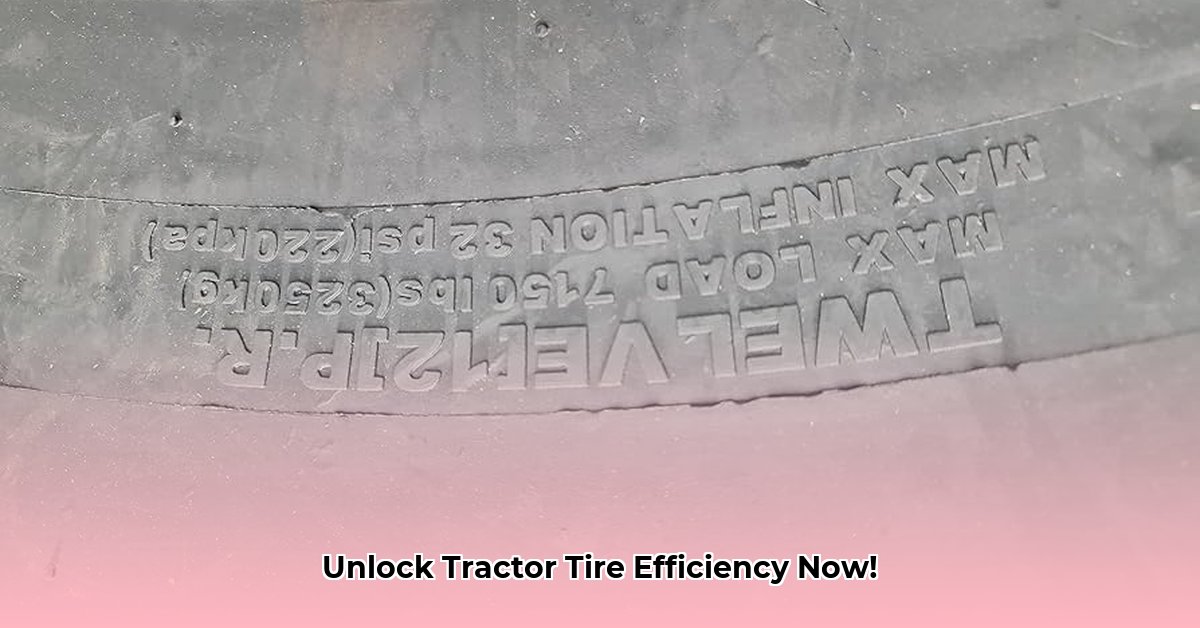
18.4 x 38 Tractor Tires: Understanding Their Role in Sustainable Agriculture
The 18.4 x 38 tractor tire—a common sight in modern farming—is more than just rubber; it's a key component influencing both farm profitability and environmental sustainability. This guide delves into the specifics of these large tires, providing actionable insights for farmers aiming to maximize their efficiency and minimize their environmental impact. We'll cover tire selection, maintenance, and future trends in sustainable tire technology. Aren't optimized tire practices key to boosting your bottom line and environmental stewardship? For more on tractor tire options, check out this resource on Ford 3000 tractor tires.
Decoding the 18.4 x 38: Size Matters, But So Does Application
The dimensions "18.4 x 38" represent the tire's width (18.4 inches) and aspect ratio (the tire's height relative to its width). This specific size is common on larger tractors, often used in expansive fields. Understanding these specifications is the first step towards selecting the appropriate tire for your specific needs and soil conditions. But simply choosing the right size isn’t enough; efficient utilization is paramount.
The Impact on Soil Health, Fuel Consumption, and the Environment
Large tractor tires, if improperly managed, can lead to soil compaction – a significant threat to long-term soil health. Compacted soil reduces water infiltration and root growth, directly impacting crop yields and potentially leading to increased reliance on water and fertilizers. This is environmentally unsustainable and costly.
However, the 18.4 x 38 tire, when properly utilized, can mitigate compaction due to its wider footprint. This improved weight distribution translates to better traction, reducing wheel slippage and consequently minimizing fuel consumption. Less fuel means reduced greenhouse gas emissions and substantial cost savings. This directly addresses the issues surrounding sustainability and economic viability.
Choosing and Maintaining Your 18.4 x 38 Tires: Practical Steps for Sustainable Farming
Selecting and maintaining your tires is crucial for maximizing their lifespan and minimizing their environmental impact. Here are key steps towards efficient management:
Assess Your Soil Type: Different soil types require different tires for optimal performance and minimal compaction. Heavy clay soils, for example, may benefit from different tire pressures and tread patterns compared to sandy soils. This is critical for efficient farming practices and sustainable land management.
Master Tire Inflation: Proper inflation is essential. Underinflation causes increased fuel consumption, premature wear, and excessive compaction. Overinflation reduces traction and shortens tire life. Consult your tractor's manual for recommended inflation pressures. Regular pressure checks are crucial.
Implement a Regular Maintenance Schedule: Regularly inspect tires for wear, cuts, and embedded objects. Rotate tires to ensure even wear and extend their lifespan. Early detection and proactive maintenance is crucial for avoiding costly replacements and reducing waste.
Explore Advanced Tire Technology: New tire technologies, such as low-pressure tires designed to reduce soil compaction and tires manufactured with sustainable bio-based materials, are constantly being developed. Staying informed about these advancements can help you make environmentally conscious choices.
Future Trends in Sustainable Agricultural Tire Technology
The agricultural tire industry is actively exploring more sustainable practices. We are seeing the development of tires made from bio-based materials, offering a reduced carbon footprint throughout their life cycle. Additionally, ongoing research focuses on extending tire life through innovative materials and manufacturing processes. Moreover, the integration of smart sensors and technology for real-time tire monitoring is expected to further optimize tire management and fuel efficiency.
Weighing the Pros and Cons of 18.4 x 38 Tractor Tires
| Advantages | Disadvantages |
|---|---|
| High load-bearing capacity | Potential for soil compaction (if improperly managed) |
| Excellent traction | Higher initial cost than smaller tires |
| Ideal for larger tractors and heavier loads | May not be suitable for all soil types and conditions |
| Can improve fuel efficiency | Requires meticulous inflation and maintenance |
The 18.4 x 38 tire is a valuable tool, but its effectiveness hinges on proper management and alignment with broader sustainability goals. Integrating these tires into a holistic approach that includes conservation tillage and precision farming techniques significantly reduces environmental impact while increasing efficiency for long-term agricultural success. "Sustainable farming isn’t just about the tire; it’s about the complete system," says Dr. Emily Carter, Agricultural Engineer at the University of California, Davis.
How to Reduce the Environmental Impact of Agricultural Tires: A Holistic Approach
Key Takeaways:
- Optimized tire pressure significantly improves fuel efficiency and prolongs tire life.
- Self-cleaning tires reduce soil compaction and enhance traction.
- Regular tire maintenance extends tire life and minimizes waste.
- Choosing tires with sustainable manufacturing processes is critical.
- Bio-based materials in tire production contribute to a smaller carbon footprint. Adopting these practices ensures long-term sustainability.
The 18.4 x 38 tire, when utilized responsibly, can be a significant asset in sustainable farming practices. By prioritizing proper maintenance, embracing new technological developments, and incorporating it into a holistic approach to farming, farmers can positively impact both their bottom line and the environment.